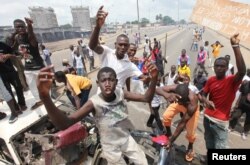The trial of former Ivorian president Laurent Gbagbo is due to begin January 28 at the International Criminal Court. Gbagbo is facing charges of crimes against humanity, based on acts allegedly committed during Ivory Coast’s post-election violence in 2010 and 2011. Gbagbo supporters plan to closely follow the trial, which many of them perceive as an insult.
In the hall of his party’s new office in Abidjan, giant posters of former Ivorian president Laurent Gbagbo are plastered on almost every wall.
Party official Aboubacar Koné said Gbagbo’s detention at the International Criminal Court "is a hostage-taking situation that does not say its name."
Koné is acting spokesperson of a faction of Gbagbo’s former party, the Ivorian Popular Front, or FPI. The party broke into two factions last year before the presidential elections.
Koné was among those who linked the party’s participation in the vote to Gbagbo's release from the ICC. That did not happen, so that faction boycotted the elections.
A few days ago, Koné called for Gbagbo supporters to pressure the ICC to release the former president, claiming his detention is the result of a conspiracy.
"The ICC is perceived by a lot of Africans as a tool for neo-colonial domination," he said. "It is not about justice, it is about politics."
Crimes against humanity
Gbagbo and his former ally Charles Blé Goudé are charged with four counts of crimes against humanity for violence that occurred in the months after the 2010 presidential elections.
Gbagbo supporters clashed with backers of challenger Alassane Ouattara after Gbagbo refused to concede defeat.
The violence left about 3,000 people dead, and ended in April 2011 with the arrest of Gbagbo. Ouattara was then installed as president and was reelected last year.
Koné said the defense would show the innocence of Gbagbo and Blé Goudé.
“If you watch all the video and listen to all the tapes nobody can prove that either of them is soliciting any violence,” he said.
But ICC prosecutors argue otherwise, and intend to present several thousand documents aimed at proving Gbagbo and his allies organized a plan to remain in power by all means necessary, including violence against civilians.
While Koné said the faction has sent a delegation to The Hague to follow the trial from the courtroom, other supporters will be following the trial from Abidjan, like Okou Thiero, the president of a pro-Gbagbo youth forum.
Thiero said he had no doubt Gbagbo was innocent, and would be released. According to him, that would help national unity. “It is the missing link to the reconciliation,” he said.
In other parts of the country, too, Gbagbo supporters will be watching, like in Gagnoa, a Gbagbo stronghold.
“We have planned to hold a vigil,” said Léandre Guika Diokri, acting spokeperson of the local FPI office. “Then on Thursday morning, we will sit in front of the TV to watch it.”
Laurent Gbagbo is the first former head of state to go on trial at the ICC.













